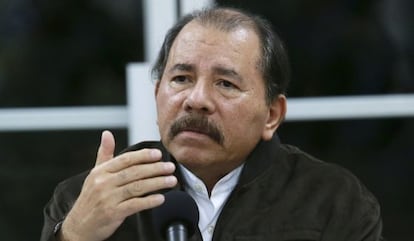Nicaragua takes Colombia to court again over maritime rights
Managua asks The Hague justices to map out Caribbean waters belonging to both nations


Nicaragua filed a new lawsuit against Colombia before the International Court of Justice on Monday, claiming maritime limits on waters that might have petroleum reserves and provide lucrative fishing opportunities.
In the lawsuit, the government of President Daniel Ortega wants The Hague court to map out the exact maritime limits it divided up between both countries in a prior ruling handed down last November.
After a long dispute, the justices gave Nicaragua a vast expanse of the Caribbean against Bogota’s wishes while at the same time they gave Colombia ownership of a group of disputed keys and islands.
Ortega’s Sandinista government claims that it has the right to some 90,000-square kilometers of water. But Colombian President Juan Manuel Santos, who has accused Nicaragua of violating the ICJ ruling by trying to explore for petroleum in waters that don’t belong to Managua, described Ortega’s attempt to extend his country’s maritime rights in the Caribbean as “unfounded ambitions.”
In a statement released by Nicaragua’s first lady Rosario Murillo, who also serves as Ortega’s spokeswoman, the Managua government said this lawsuit will hopefully finally resolve the border markers “without affecting third states.”
This latest move by Nicaragua was not a surprising one, especially after Ortega asked for dialogue with Santos, who earlier said that the ICJ ruling was inapplicable.
Colombia said that Nicaragua was violating international law by filing a second lawsuit
Ortega proposed that both countries appoint a joint commission to ensure that the UN court’s ruling was being followed. But on Thursday, Santos announced that he had filed a petition with Colombia’s Constitutional Court declaring the so-called Pact of Bogota unconstitutional. That 1948 treaty was signed among the members of the Organization of American States (OAS), and obliges them to settle disputes amicably and respect international court rulings.
“The possibility of a bilateral negotiation has been ruled out because of Colombia’s reaction to the November 19, 2012 ruling, which is widely known by the international community,” reads the lawsuit signed by Nicaragua’s ambassador to the ICJ, Carlos Agüello.
“Currently, Colombia is using internal law as a pretext to avoid its international obligations and has declared the ruling as ‘inapplicable’,” it continues.
Specifically, Nicaragua is asking the court for a “precise” map of the maritime boundaries of Nicaragua’s continental shelf in the Caribbean, more accurately than the 200-nautical mile limit that the court described last year.
In its own statement, Colombia said that it was prepared to challenge the ruling but charged that Nicaragua was violating international law by filing a second lawsuit, which could also hurt third countries such as Costa Rica, which has its own maritime dispute with the Managua government before the court. Colombia believes that Nicaragua’s “ambitions” could also affect the water rights of Panama and Jamaica.
Relations have been tense between Colombia and Nicaragua since, following the 1979 Sandinista Revolution, the Managua government announced that it would not recognize a prior treaty that mapped out the borders because it violated national sovereignty. Both countries had decided to go to the ICJ to resolve their dispute.
Tu suscripción se está usando en otro dispositivo
¿Quieres añadir otro usuario a tu suscripción?
Si continúas leyendo en este dispositivo, no se podrá leer en el otro.
FlechaTu suscripción se está usando en otro dispositivo y solo puedes acceder a EL PAÍS desde un dispositivo a la vez.
Si quieres compartir tu cuenta, cambia tu suscripción a la modalidad Premium, así podrás añadir otro usuario. Cada uno accederá con su propia cuenta de email, lo que os permitirá personalizar vuestra experiencia en EL PAÍS.
¿Tienes una suscripción de empresa? Accede aquí para contratar más cuentas.
En el caso de no saber quién está usando tu cuenta, te recomendamos cambiar tu contraseña aquí.
Si decides continuar compartiendo tu cuenta, este mensaje se mostrará en tu dispositivo y en el de la otra persona que está usando tu cuenta de forma indefinida, afectando a tu experiencia de lectura. Puedes consultar aquí los términos y condiciones de la suscripción digital.








































